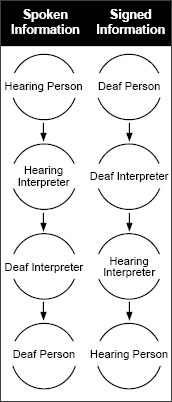Deaf Interpreter, Sign Language Interpreter—What’s the difference?
Lorrie Kosinski is a certified sign language interpreter who has served as the on-staff interpreter/interpreter coordinator and Communication Specialist for Denver City/County agencies through the Denver Office of Disability Rights since 1987. Lorrie is also a presenter, interpreter trainer, and mentor, specializing in legal and religious interpreting.
I have been privileged to work within a deaf/hearing interpreter team for the past ten plus years and I have found it to be an educational experience as well as an incredibly effective and accurate process for communication. I have since created a protocol, through the Denver Office of Disability Rights, for the use a deaf interpreter for assignments throughout City & County of Denver government agencies.
A deaf/hearing team of interpreters is still a fairly new concept to both deaf and hearing consumers here in Colorado. So, at this point I wouldn’t be surprised if readers are asking themselves, “What IS the difference between a deaf interpreter and a sign language interpreter, and when would I need one?”
What IS a deaf interpreter?
A deaf interpreter (DI) is an individual who is deaf or hard of hearing and possess excellent communication skills in both American Sign Language and English. The DI has been trained in the role and ethics of an interpreter, and may also have specialized training and/or experience in use of gesture, mime, props, drawings, home signs, and matching sentence structure and language development of the deaf person for whom they are interpreting.
In addition, the DI has an extensive knowledge and understanding of deafness, the deaf community, and/or Deaf culture. S/he brings this expertise with him/her when working as a team with a hearing sign language interpreter.
The Registry of Interpreters for the Deaf, the national certifying body for sign language interpreters, awards certification to deaf interpreters, after they pass an extensive written and performance test. This group of interpreters is referred to as Certified Deaf Interpreters (CDIs).
When would you need a deaf interpreter?
In the City/County of Denver I use a deaf/hearing team for all kinds of interpreting requests, particularly anything legal in nature where accuracy of the record is of the utmost necessity. I always appreciate a second set of eyes, especially those of a native ASL user, when interpreting for people in the following circumstances:
- deaf youth;
- a developmentally disabled Deaf person;
- someone using non-standard American Sign Language (ASL) or a unique dialect of ASL;
- a deaf person who uses a foreign sign language;
- a victim;
- a deaf person overwhelmed by the pace of the interpreting process;
- and again, in a variety of legal situations.
Parents of a deaf child/youth have the right to request a deaf interpreter for their child for medical appointments, evaluations, any type of legal/court processes, counseling, mental health counseling, etc. Imagine having a deaf, native sign language user interpreting for your deaf child!
I’ve witnessed the rapport that develops between the deaf interpreter and the deaf consumer and how that enhances the communication process. Often, when I show up to an assignment with my deaf team interpreter, I see a look of relief on the deaf consumer’s face which seems to say, “Wow, I’m not alone in this process. There is another deaf person here to go through it with me.”
How does the interpreting process work with a deaf interpreter?
 A deaf Interpreter works as a team member with a sign language interpreter who can hear. Using a consecutive interpreting process, the hearing interpreter will relay the message from the hearing consumer to the deaf interpreter. The deaf interpreter will interpret the message linguistically and culturally to the deaf consumer in the language most readily understood by the deaf consumer. Essentially, it becomes one deaf person interpreting for another deaf person.
A deaf Interpreter works as a team member with a sign language interpreter who can hear. Using a consecutive interpreting process, the hearing interpreter will relay the message from the hearing consumer to the deaf interpreter. The deaf interpreter will interpret the message linguistically and culturally to the deaf consumer in the language most readily understood by the deaf consumer. Essentially, it becomes one deaf person interpreting for another deaf person.
In even more challenging situations, the Deaf and hearing interpreters may work together to understand a Deaf person’s message, and confer with each other to arrive at their best interpretation. They would then convey that interpretation to the hearing party.
The deaf interpreter is bound by the same Code of Professional Conduct as the hearing interpreter, which includes keeping all assignment-related information confidential, acting in a professional and neutral manner at all times (the deaf interpreter is NOT an advocate), and relaying all information in an accurate manner capturing the emotion as well as the message.
What are the benefits of using a deaf/hearing interpreting team?
Understandably, the consecutive interpreting process will require a little more time than simultaneous interpreting or working with one interpreter, but believe me, it is worth it! The overall benefits of utilizing a deaf/hearing interpreter team include optimal understanding by all parties, and efficient use of everyone’s time and resources.
I believe that it is more economical to take a little extra time with the deaf/hearing interpreting process than to have to reschedule and go through the whole process again because it didn’t work out with just the one hearing interpreter the first time.
For more information on deaf/hearing team interpreting:
If you would like more information on this topic go to www.rid.org and download the Standard Practice Paper on the Deaf Interpreter listed under “Interpreting & RID.” Also, feel free to contact me with any questions you have or to request a one page hand-out on “The Role of a Deaf/Hearing Team” that I use within the City/County of Denver agencies. You can reach me at lorrie.kosinski@denvergov.org, 720.913.8487 V, 720.913.8484 TTY.
 Home
Home